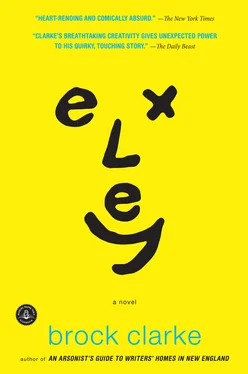Q: ( Long pause .) You read the book even though your dad asked you not to.
A: ( Crying quietly .) Yes.
Q: And you think your dad joined the army and went to Iraq because you disappointed him by reading the book when you said you wouldn’t?
A: ( Sniffling .) Yes. Why did I have to do that? ( Long pause .) He loved the book so much. I just wanted to see why he loved it so much.
Q: But I thought he joined up because of K.? Did he join up because he’d had an affair with K. and your mother kicked him out of the house? Or did he join up because he found out you read A Fan’s Notes ?
A: ( Long pause .) I think maybe it was both.
Q: And didn’t you wonder in your journal if your dad had joined up so that the war could get over faster and A Fan’s Notes could then be an America on the Same Page book?
A: I wanted that to be true. But I didn’t really believe it was.
Q: And didn’t you also think in your journal that your dad had decided the world was killing and death, and if that were true, then he didn’t need A Fan’s Notes anymore?
A: I didn’t really mean that.
Q: Even though that’s what he basically did in his last letter. Got rid of A Fan’s Notes .
A: What last letter?
Q: ( Silence .)
A: What last letter ? I only got one from my dad. He never wrote me another one.
Q: ( Silence .)
A: Did he?
Q: Anyway, now your dad is back.
A: Yes.
Q: He’s really back and he’s really a patient in the VA hospital.
A: Yes!
Q: And you’re trying to find Exley and bring him to your dad.
A: Yes.
Q: And you think that will help your dad get better.
A: I know it will.
Q: How do you know that Exley can do that?
A: Because my dad was fine before he gave up Exley and went to Iraq.
Q: It doesn’t sound like your mother thought your dad was fine.
A: ( Long pause .) Is that a question? Because it doesn’t sound like a question.
Q: And what do you think will happen if you don’t find Exley?
A: ( Long pause .) If I don’t find Exley, then I think my dad is going to die.
Doctor’s Notes (Entry 23)
After I have completed my interview with M., I put down my pen, come out from behind my desk, and sit next to him on the couch. Such sharing of furniture between oneself and one’s patient is, of course, considered improper. But so is sitting shirtless in front of one’s patient, and so is falling in love with one’s patient’s mother, and so is breaking into one’s patient’s house. Besides, M. looks so sad, so small, so diminished sitting on my couch alone, that I can’t let him sit there by himself. I even put my arm around him, which is definitely verboten, which M. knows, since he falsely accused me of doing much worse in his false diary. But I don’t care. Fuck it , I think, and then light a cigarette and offer M. one, too. He declines, and I am relieved that he declines, which shows that I’m not totally gone yet.
“I think you should take me to see your dad,” I say.
“I thought you didn’t believe that he was my dad,” he says.
“I didn’t,” I say. “But I do now.” In truth, I still don’t entirely believe him. But I believe every other answer M. gave in our interview was true — including his not knowing about the three letters on his mother’s dresser — and so I don’t entirely not believe him, either. A tricky bit of business, this believing in someone else. So tricky that we would never do it, if we did not want someone, someday, to believe in us, too. “I believe your dad is in the VA hospital. I want you to take me to see him.”
M. shakes his head. “No,” he says.
“M. — ,” I start to say, but M. cuts me off.
“No!” he yells, and he does not seem so small, so diminished anymore. “I did that with J. and it ended up being terrible. The only person who can see my dad besides me is Exley. If you want to help me, you need to help me find Exley.”
I think about what Mr. D. has told me: That Exley is dead. That he’s buried up in Brookside Cemetery. That if anyone is qualified to tell M. this terrible news, it’s me, his doctor: “M.,” I say, “there’s no use in going to Alexandria Bay. Exley is. ” M.’s face seems to indicate that he knows what I’m about to say: his face contracts, as though preparing itself for some awful pain. I can picture him hearing the news that Exley is dead. I can picture him giving up on his quest to save his father, if it really is his father. I can picture him going home to his mother and telling her everything. I can picture her calling me to tell me my services are no longer needed and thanks for nothing. I can picture my own face contracting in pain. And then I cannot picture it ever stopping. This is the problem with pain: it makes it impossible to imagine anything but its going on forever, unless it allows you to imagine doing anything and everything to stop it from going on forever. “If I help you,” I say to M., “will you tell your mother that you lied in your diary entry? Will you tell her that I actually am a nice man, who’d do anything for her?”
“For her?”
“I mean, for you,” I say. “For both of you.”
M. says he will, and then he looks at me in that way of his, that way that suggests you aren’t exactly a human being, but rather a possible cog, a potential working part of one of his mysterious ideas. “Do you really mean that? That you’d do anything for us?”
“Yes,” I say. “Are we agreed?”
M. indicates that we are.
“OK,” I say. “I’ll help you find Exley.”
I expect M. to exult in this news, but he does not. “I know you will,” he says gravely, like there’s serious business yet to be done. He then reaches into his back pocket, pulls out several pieces of paper, and says, “We’ll start with these lists.”
Things I Learned from My Dad, Who Learned Them from Exley (Lesson 5: Love)
We were looking at photo albums in the living room. I don’t know how old I was, specifically, but generally, I was at the age when you first get the idea that your parents’ lives didn’t begin when yours did. My parents were sitting on either side of me, on the couch, and letting me flip the pages, which was a mistake. I don’t know about you, but I love looking through photo albums, and one of the things I love most about it is not looking at the photos but seeing how fast I can flip the pages.
“Whoa, bud,” my dad said. “Slow down.” He put his hand on a page to stop me from flipping it. I looked at the photo next to where his hand was. It was of Mother and my dad. They were standing in front of a wooden bar with a mirror behind the bar. There were Christmas decorations around the mirror, but still, I recognized it as the Crystal. My dad looked younger, and thinner than he’d been before he went to Iraq. Mother was standing next to him, wearing a plaid skirt and a red sweater and generally dressed for the holiday. Her cheeks were red like her sweater, and she looked very pretty. They were both holding glasses of nog. My parents both looked genuinely happy — not happy like they were trying to convince the photographer that they were happy, but happy like they didn’t care what the photographer thought. I felt like I could have looked at the picture forever, even though I didn’t quite believe it was real, maybe because it was taken before I was born.
“When was this?” I said. Mother took the photo out of the plastic sleeve and flipped it over. It said, in her handwriting: “Dec. 20, 198–.”
Читать дальше












